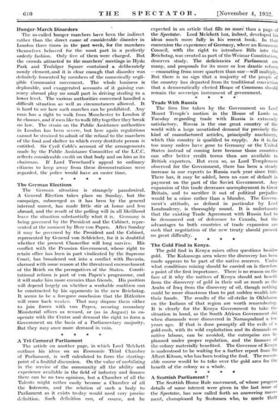A Tri-Cameral Parliament The article on another page, in which
Lord Melehett outlines his ideas on an Economic Third Chamber of Parliament, is well calculated to form the starting- point of a fruitful discussion. On the value of mobilizing in the service of the community all the ability and experience available in the field of industry and finance there can be no two opinions, but a Chamber of all the Talents might rather easily become a Chamber of all the Interests, and the relation of such a body to Parliament as it exists to-day would need very precise definition. Such definition can, of course, not be expected in an article that fills no more than a page of the Spectaior. Lord Melehett has, indeed, developed his ideas much more fully in his recent book. In that connexion the experience of Germany, where an Economic Council, With the right to introduce Bills into the Reichstag, was created as part of the Weimar Constitution, deserves study. The deficiencies of Parliament are many, and proposals for its more or less drastic reform —emanating from more quarters than one—will multiply. But there is no sign that a majority of the people of the country has departed from its traditional conviction that a democratically elected House of Commons should remain the sovereign instrument of government.










































 Previous page
Previous page